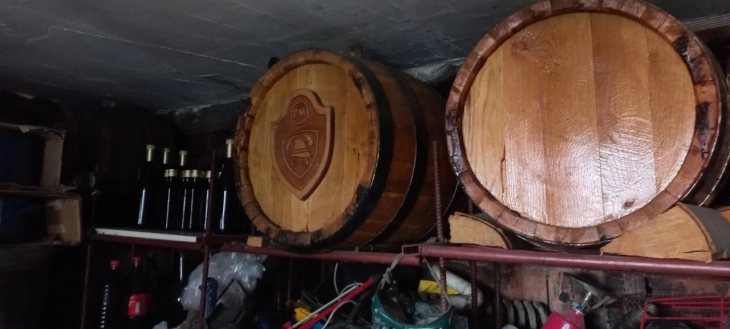Sealed casks of rakija for the most special moments in life – a Tikvesh custom
- Post By Ivan Kolekevski
- 06:30, 8 August, 2022

Kavadarci, 8 August 2022 (MIA) – Sealed casks of rakija are kept for years or even decades in the Tikvesh region, so that the rakija can be savored during the most special moments in life. To raise a toast when the heart sings from joy, and the soul weeps from happiness.
Panche Arsovski, head of the “Zh’ta” association from Kavadarci, told MIA he too honored this custom when his children were born, and sealed rakija in vessels, allowing it to age and saving it for special moments.
“I sealed the rakija in birlaks. A birlak is a large glass vessel, lined with a special kind of woven willows,” said Arsovski.
 Rade Zokov from the village of Resava in Kavadarci, which is famous for the production of good wine and rakija, told MIA that he and his wife sealed rakija when their son and daughter were born.
“We keep the rakija in wooden casks, made from oak. One of the casks holds 24-year-old rakija, the other 22. When we sealed the rakija, it was transparent, but through the years it naturally turned yellow from the oak. If all is well, we will drink it at special occasions, that’s why it’s saved, to drink it and raise a toast for good luck,” said Zokov, adding that they have recently registered a family winery, and are preparing to build a mini winery.
Dane Joshev from Kavadarci told MIA that the tradition is for the casks to be sealed mainly when a child is born. The rakija is then kept untouched for years. The cask is unsealed when the kid graduates, moves out or goes through some other joyful moment in life.
“Such is the custom; it has been passed on for generations. When there is a celebration in the house, we drink the rakija which has been maturing for years in a cask or a birlak,” said Joshev.
The people that we talked to said that this was the case for this year’s high-school graduation celebrations as well. During the celebrations in Tikvesh, the biggest wine region in the country, casks holding 18-year-old rakija are unsealed by the closest relatives, allowing the guests to enjoy the homemade grape rakija.
Rade Zokov from the village of Resava in Kavadarci, which is famous for the production of good wine and rakija, told MIA that he and his wife sealed rakija when their son and daughter were born.
“We keep the rakija in wooden casks, made from oak. One of the casks holds 24-year-old rakija, the other 22. When we sealed the rakija, it was transparent, but through the years it naturally turned yellow from the oak. If all is well, we will drink it at special occasions, that’s why it’s saved, to drink it and raise a toast for good luck,” said Zokov, adding that they have recently registered a family winery, and are preparing to build a mini winery.
Dane Joshev from Kavadarci told MIA that the tradition is for the casks to be sealed mainly when a child is born. The rakija is then kept untouched for years. The cask is unsealed when the kid graduates, moves out or goes through some other joyful moment in life.
“Such is the custom; it has been passed on for generations. When there is a celebration in the house, we drink the rakija which has been maturing for years in a cask or a birlak,” said Joshev.
The people that we talked to said that this was the case for this year’s high-school graduation celebrations as well. During the celebrations in Tikvesh, the biggest wine region in the country, casks holding 18-year-old rakija are unsealed by the closest relatives, allowing the guests to enjoy the homemade grape rakija.
 In fact, it’s an old custom in Tikvesh. When a child is born, the closest relatives seal rakija in a wooden cask and keep it for years. The amount of rakija depends on their capabilities. When the child grows up, the rakija is enjoyed with guests at special occasions for things like proms, graduations, engagements or marriages.
Joshev, who is a president of a regional association of winegrowers, mentioned this was the case a few years ago too, when his granddaughter graduated high school.
“When she was born, we sealed homemade rakija in a wooden cask in order to have a toast during special occasions. Such was the case for the other grandchildren as well. Throughout the years, the cask naturally absorbs, or as we say in Tikvesh, drinks from the rakija. So, from time to time around every two years, we add a bit of rakija to the cask. After around eight or nine years, we bottle the rakija and save it for special days such as proms or engagements. We put out some of the rakija at the prom so the guests can enjoy and be happy with our customs,” said Joshev.
It was his first granddaughter to graduate and he was very pleased about it.
“The guests really liked the 18-year-old rakija. They said it was very good. There is no non-alcoholic, nor an alcoholic beverage which can replace it, even if it had a famous name, or even if it was produced abroad. That old rakija is a balm for the soul. It’s like olive oil, some would say, because when it’s poured in a glass it spreads slowly like oil. Those who have tried it, know,” he said.
In fact, it’s an old custom in Tikvesh. When a child is born, the closest relatives seal rakija in a wooden cask and keep it for years. The amount of rakija depends on their capabilities. When the child grows up, the rakija is enjoyed with guests at special occasions for things like proms, graduations, engagements or marriages.
Joshev, who is a president of a regional association of winegrowers, mentioned this was the case a few years ago too, when his granddaughter graduated high school.
“When she was born, we sealed homemade rakija in a wooden cask in order to have a toast during special occasions. Such was the case for the other grandchildren as well. Throughout the years, the cask naturally absorbs, or as we say in Tikvesh, drinks from the rakija. So, from time to time around every two years, we add a bit of rakija to the cask. After around eight or nine years, we bottle the rakija and save it for special days such as proms or engagements. We put out some of the rakija at the prom so the guests can enjoy and be happy with our customs,” said Joshev.
It was his first granddaughter to graduate and he was very pleased about it.
“The guests really liked the 18-year-old rakija. They said it was very good. There is no non-alcoholic, nor an alcoholic beverage which can replace it, even if it had a famous name, or even if it was produced abroad. That old rakija is a balm for the soul. It’s like olive oil, some would say, because when it’s poured in a glass it spreads slowly like oil. Those who have tried it, know,” he said.
 He said that the rakija he keeps for his granddaughter’s wedding is still untouched, so if all is well, when she gets married, they will savor that one as well.
Usually, for engagements, he said, around six liters of rakija are consumed. Around thirty for weddings.
We asked him whether the strength of the rakija decreases as it ages.
“Even after it matures, the strength remains around the same. The density and the taste change. It gains a certain aroma. The older it is, the better. When we seal it, the alcohol content is around 50 percent, it can drop to around 47. It remains pure grape rakija, without sugars, nothing artificial, no chemicals,” said Joshev.
The other people from the region agree, such rakija when consumed in moderation, has a beneficial effect on the organism.
He said that the rakija he keeps for his granddaughter’s wedding is still untouched, so if all is well, when she gets married, they will savor that one as well.
Usually, for engagements, he said, around six liters of rakija are consumed. Around thirty for weddings.
We asked him whether the strength of the rakija decreases as it ages.
“Even after it matures, the strength remains around the same. The density and the taste change. It gains a certain aroma. The older it is, the better. When we seal it, the alcohol content is around 50 percent, it can drop to around 47. It remains pure grape rakija, without sugars, nothing artificial, no chemicals,” said Joshev.
The other people from the region agree, such rakija when consumed in moderation, has a beneficial effect on the organism.
 Good, old rakija in Tikvesh can also be consumed when someone retires, so on occasions marking someone’s entry into the third age of life, it is possible to taste homemade rakija which has “slept” for multiple decades.
Letting homemade rakija sit for years and even decades in order to be saved for the most special moments in one’s life, is a custom passed down from generation to generation.
Regardless of whether the old rakija is kept in the attic or the cellar, it represents a real treasure and pride for the owner. It makes every special moment in life more special.
Svetlana Darudova
Translated by Angel Dimoski
Good, old rakija in Tikvesh can also be consumed when someone retires, so on occasions marking someone’s entry into the third age of life, it is possible to taste homemade rakija which has “slept” for multiple decades.
Letting homemade rakija sit for years and even decades in order to be saved for the most special moments in one’s life, is a custom passed down from generation to generation.
Regardless of whether the old rakija is kept in the attic or the cellar, it represents a real treasure and pride for the owner. It makes every special moment in life more special.
Svetlana Darudova
Translated by Angel Dimoski
 Rade Zokov from the village of Resava in Kavadarci, which is famous for the production of good wine and rakija, told MIA that he and his wife sealed rakija when their son and daughter were born.
“We keep the rakija in wooden casks, made from oak. One of the casks holds 24-year-old rakija, the other 22. When we sealed the rakija, it was transparent, but through the years it naturally turned yellow from the oak. If all is well, we will drink it at special occasions, that’s why it’s saved, to drink it and raise a toast for good luck,” said Zokov, adding that they have recently registered a family winery, and are preparing to build a mini winery.
Dane Joshev from Kavadarci told MIA that the tradition is for the casks to be sealed mainly when a child is born. The rakija is then kept untouched for years. The cask is unsealed when the kid graduates, moves out or goes through some other joyful moment in life.
“Such is the custom; it has been passed on for generations. When there is a celebration in the house, we drink the rakija which has been maturing for years in a cask or a birlak,” said Joshev.
The people that we talked to said that this was the case for this year’s high-school graduation celebrations as well. During the celebrations in Tikvesh, the biggest wine region in the country, casks holding 18-year-old rakija are unsealed by the closest relatives, allowing the guests to enjoy the homemade grape rakija.
Rade Zokov from the village of Resava in Kavadarci, which is famous for the production of good wine and rakija, told MIA that he and his wife sealed rakija when their son and daughter were born.
“We keep the rakija in wooden casks, made from oak. One of the casks holds 24-year-old rakija, the other 22. When we sealed the rakija, it was transparent, but through the years it naturally turned yellow from the oak. If all is well, we will drink it at special occasions, that’s why it’s saved, to drink it and raise a toast for good luck,” said Zokov, adding that they have recently registered a family winery, and are preparing to build a mini winery.
Dane Joshev from Kavadarci told MIA that the tradition is for the casks to be sealed mainly when a child is born. The rakija is then kept untouched for years. The cask is unsealed when the kid graduates, moves out or goes through some other joyful moment in life.
“Such is the custom; it has been passed on for generations. When there is a celebration in the house, we drink the rakija which has been maturing for years in a cask or a birlak,” said Joshev.
The people that we talked to said that this was the case for this year’s high-school graduation celebrations as well. During the celebrations in Tikvesh, the biggest wine region in the country, casks holding 18-year-old rakija are unsealed by the closest relatives, allowing the guests to enjoy the homemade grape rakija.
 In fact, it’s an old custom in Tikvesh. When a child is born, the closest relatives seal rakija in a wooden cask and keep it for years. The amount of rakija depends on their capabilities. When the child grows up, the rakija is enjoyed with guests at special occasions for things like proms, graduations, engagements or marriages.
Joshev, who is a president of a regional association of winegrowers, mentioned this was the case a few years ago too, when his granddaughter graduated high school.
“When she was born, we sealed homemade rakija in a wooden cask in order to have a toast during special occasions. Such was the case for the other grandchildren as well. Throughout the years, the cask naturally absorbs, or as we say in Tikvesh, drinks from the rakija. So, from time to time around every two years, we add a bit of rakija to the cask. After around eight or nine years, we bottle the rakija and save it for special days such as proms or engagements. We put out some of the rakija at the prom so the guests can enjoy and be happy with our customs,” said Joshev.
It was his first granddaughter to graduate and he was very pleased about it.
“The guests really liked the 18-year-old rakija. They said it was very good. There is no non-alcoholic, nor an alcoholic beverage which can replace it, even if it had a famous name, or even if it was produced abroad. That old rakija is a balm for the soul. It’s like olive oil, some would say, because when it’s poured in a glass it spreads slowly like oil. Those who have tried it, know,” he said.
In fact, it’s an old custom in Tikvesh. When a child is born, the closest relatives seal rakija in a wooden cask and keep it for years. The amount of rakija depends on their capabilities. When the child grows up, the rakija is enjoyed with guests at special occasions for things like proms, graduations, engagements or marriages.
Joshev, who is a president of a regional association of winegrowers, mentioned this was the case a few years ago too, when his granddaughter graduated high school.
“When she was born, we sealed homemade rakija in a wooden cask in order to have a toast during special occasions. Such was the case for the other grandchildren as well. Throughout the years, the cask naturally absorbs, or as we say in Tikvesh, drinks from the rakija. So, from time to time around every two years, we add a bit of rakija to the cask. After around eight or nine years, we bottle the rakija and save it for special days such as proms or engagements. We put out some of the rakija at the prom so the guests can enjoy and be happy with our customs,” said Joshev.
It was his first granddaughter to graduate and he was very pleased about it.
“The guests really liked the 18-year-old rakija. They said it was very good. There is no non-alcoholic, nor an alcoholic beverage which can replace it, even if it had a famous name, or even if it was produced abroad. That old rakija is a balm for the soul. It’s like olive oil, some would say, because when it’s poured in a glass it spreads slowly like oil. Those who have tried it, know,” he said.
 He said that the rakija he keeps for his granddaughter’s wedding is still untouched, so if all is well, when she gets married, they will savor that one as well.
Usually, for engagements, he said, around six liters of rakija are consumed. Around thirty for weddings.
We asked him whether the strength of the rakija decreases as it ages.
“Even after it matures, the strength remains around the same. The density and the taste change. It gains a certain aroma. The older it is, the better. When we seal it, the alcohol content is around 50 percent, it can drop to around 47. It remains pure grape rakija, without sugars, nothing artificial, no chemicals,” said Joshev.
The other people from the region agree, such rakija when consumed in moderation, has a beneficial effect on the organism.
He said that the rakija he keeps for his granddaughter’s wedding is still untouched, so if all is well, when she gets married, they will savor that one as well.
Usually, for engagements, he said, around six liters of rakija are consumed. Around thirty for weddings.
We asked him whether the strength of the rakija decreases as it ages.
“Even after it matures, the strength remains around the same. The density and the taste change. It gains a certain aroma. The older it is, the better. When we seal it, the alcohol content is around 50 percent, it can drop to around 47. It remains pure grape rakija, without sugars, nothing artificial, no chemicals,” said Joshev.
The other people from the region agree, such rakija when consumed in moderation, has a beneficial effect on the organism.
 Good, old rakija in Tikvesh can also be consumed when someone retires, so on occasions marking someone’s entry into the third age of life, it is possible to taste homemade rakija which has “slept” for multiple decades.
Letting homemade rakija sit for years and even decades in order to be saved for the most special moments in one’s life, is a custom passed down from generation to generation.
Regardless of whether the old rakija is kept in the attic or the cellar, it represents a real treasure and pride for the owner. It makes every special moment in life more special.
Svetlana Darudova
Translated by Angel Dimoski
Good, old rakija in Tikvesh can also be consumed when someone retires, so on occasions marking someone’s entry into the third age of life, it is possible to taste homemade rakija which has “slept” for multiple decades.
Letting homemade rakija sit for years and even decades in order to be saved for the most special moments in one’s life, is a custom passed down from generation to generation.
Regardless of whether the old rakija is kept in the attic or the cellar, it represents a real treasure and pride for the owner. It makes every special moment in life more special.
Svetlana Darudova
Translated by Angel Dimoski 






